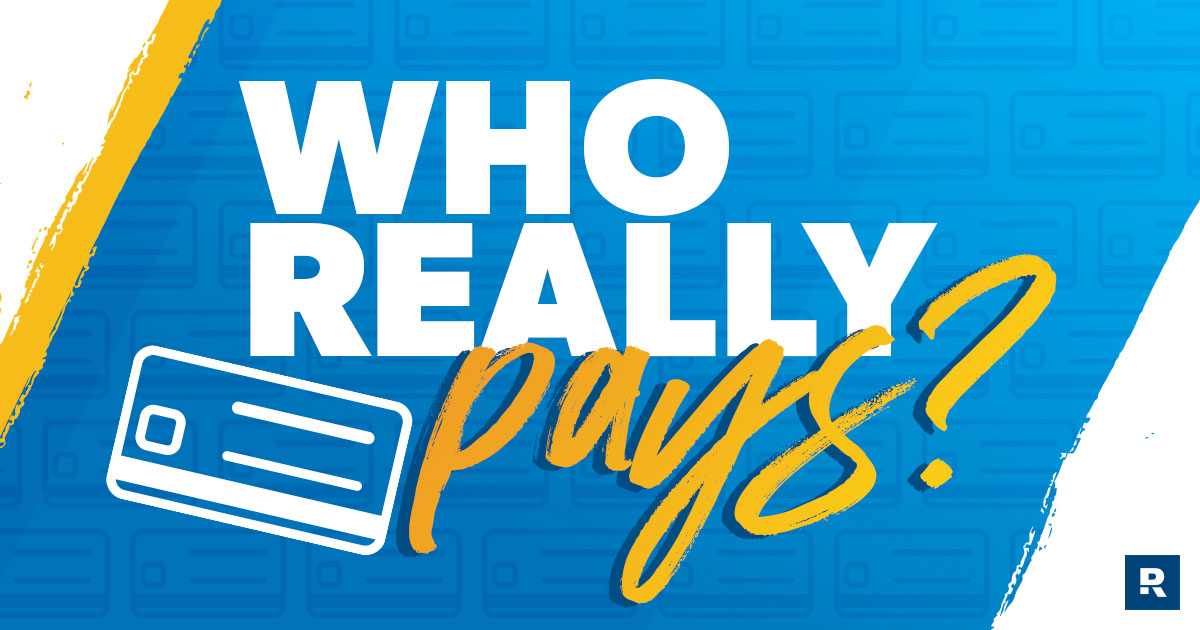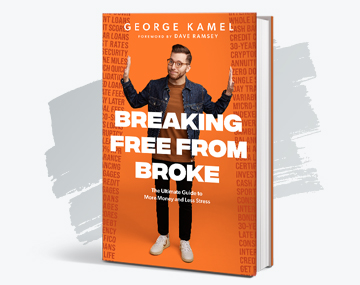
So, the credit card company is offering you cash back, miles, points and whatever else they can think of every time you swipe their card—all from the goodness of their hearts to help you get ahead with your finances. Right?
Wrong.
Credit card rewards may seem like a no-brainer, but we’ve got three big questions: How do they stack up next to interest payments? Is there a better way to manage your money? And who’s really paying for those perks? The answers here will reveal the truth about credit card rewards.
Credit Card Interest vs. Credit Card Rewards
But What if You Pay Off Your Credit Card Balance Each Month?
Who Really Pays for Those Credit Card Rewards?
Credit Card Interest vs. Credit Card Rewards
Let’s talk about credit card interest and how it relates to those rewards. According to our quarterly research, 4 in 10 Americans who have a credit card carry a balance and are racking up interest. The average annual percentage rate (APR) on credit cards hit 18.43% in mid-2022—and now it’s at 20.4%.1
Check out this math: If you multiply that interest rate by the amount of credit card debt in America (which is at a whopping $986 billion), we’re talking about credit card companies making over $201 billion on interest alone.2
Credit card companies use cash-back offers to lure you in and encourage you to spend more—because you’ll get something out of it in the end, or so you tell yourself. But who’s really getting something out of it?
The credit card companies.
That 1% cash back is an easy give from companies who are sucking around 20% in interest out of 40% of Americans.
Credit card rewards aren’t a tool. They’re. A. Trap.
But What if You Pay Off Your Credit Card Balance Each Month?
Okay, so say you do pay off your balance each month. It feels like you’re being responsible and building a strong credit score. It feels like you’ve got a cash-flow plan and security. It feels like those rewards are just icing on the top of what you buy anyway.
Listen. Those feelings are just distracting you from these truths:
1. A credit score isn’t your friend.
FICO runs so deep these days, you might think it’s been around forever—like the U.S. probably needed one to make the Louisiana Purchase. But guess what: The FICO score didn’t even become a thing until 1989. It’s a new “standard” we’re told we have to measure up to. But in reality, a FICO score doesn’t tell anyone if you’re wealthy, responsible or successful. It just says how steady you’ve been at making payments to banks and lenders over and over again.
Here’s a list of things you can do without a FICO score (despite what people tell you): buy a house, rent an apartment, buy a car, rent a car, apply for a job, anything. Literally anything.
Too many Americans are falling for the lie that you need a “good” credit score. Hey. Your worth isn’t set by a number. You’re more than that. Just say no to FICO.
2. Credit cards aren’t a good cash-flow plan.
Maybe you use credit cards to cash flow your spending—you use them to pay for normal monthly expenses and make a bulk payment at the end of the month to cover the balance. You aren’t worried because you do pay off the balance. You never deal with interest.
In this case, you’ve made credit cards your money management system. But there’s a much better way! It’s called budgeting. With the money you actually have. Right now.
Don’t let credit control your life! Learn the proven plan to win with money.
When you budget every dollar you make every month, you’ll see spending habits you didn’t even realize you had. Paying a lump sum at the end of the month means you don’t see just how often you buy breakfast biscuits on the way to work. What if you’re literally eating away at what could be a healthy retirement fund? When you track every expense, your expenses can’t hide from you.
Budgets make you accountable. To yourself. It’s not just about “being responsible” by paying off a balance on purchases you won’t remember by the end of the month. It’s about taking ownership of your spending each and every day and making your money work as hard for you as you work for it.
P.S. We know a free budgeting app called EveryDollar, if you need one!
More Money. Less Stress. Yes, Please.
In his new book, George Kamel does the research for you and exposes all the worst money traps out there so you can build real wealth!
3. Credit cards suck in emergencies.
Finish this sentence: I have a credit card, but I only use it for ________. If you filled in the blank with “ emergencies,” you’re not the only one. Lots of people say they’ll only use their credit card when they’ve got a big, unexpected, urgent expense.
But here’s the deal: The last thing you need after dealing with an emergency is to pay interest as you pay back that money for months—that’s just salt in the wound. Yes, you want to have security knowing you can stand up against whatever life throws at you. We all do, and that’s 100% natural.
But guess what? When you put your security in actual cash in the bank (aka an emergency fund), you’ll rest easy knowing you can pay that bill today. (Not throughout the next months or year. Plus interest.)
4. Credit card rewards come with a cost.
One of the biggest arguments for credit cards is their oh-so-tempting reward system. We tell ourselves we’re just using that card to pay for normal life things—gas, groceries, even utility bills. So, getting cash back or points for money you spend anyway feels like an easy “Yes, please!” That’s why they call them rewards. Right?
Hold up. There’s something behind this rewards scheme you should know.
Who Really Pays for Those Credit Card Rewards?
Credit card companies make their money in three ways: 1) fees paid by cardholders, 2) transaction fees paid by businesses, and 3) interest paid by cardholders. They take that money to build sky-high towers, create irresistible ad campaigns, and paint their product as a rewarding no-brainer. That way, they bring in more cardholders—which puts more money in their pockets.
But at what cost?
Look: Part of what pays for your rewards is the interest payments from other people.
Let that sink in—the 40% of people who don’t pay off their balances each month and get slapped with interest payments are the ones paying for your rewards. They’re feeding that $201 billion income on interest alone!
And why can’t they pay their balance at the end of the month? We don’t know. Maybe a family has a medical bill pop up they can’t cover because that month’s budget is already too tight. Maybe a single mom is scraping by, holding her breath every time she swipes her card at the grocery checkout. Seriously, we aren’t just making this stuff up—these are real stories we’ve heard from real people. Suddenly those airline miles don’t seem so rewarding.
Tell credit card companies you won’t be a part of it. If you’ve been using credit cards for points or miles or cash back or whatever—not knowing it was at the expense of others—you can stop that. Today.
Here’s what you’ll gain: using your money in real time, knowing where every dollar is going, and creating true security, interest-free. These are rewards we can get behind.
We know it’s a lot to shift your mindset about credit cards. But listen, you don’t have to figure all this out alone! Check out Financial Peace University (FPU). Seriously, get in there and start watching the first two lessons in FPU on budgeting and debt. Today.
This is your first step to learning exactly how to make your money work for you. Not the credit card companies. You.
Expert Advice Delivered Straight to Your Inbox
Our weekly email newsletter is full of practical advice you can easily apply to your daily routine so you can win with your money, relationships and career.



